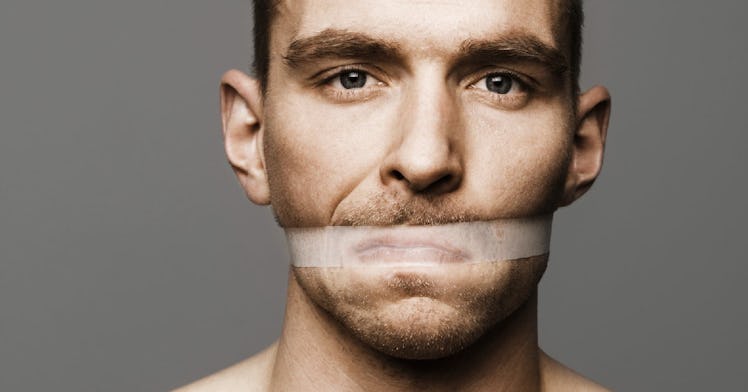The Whole Truth About Mouth Taping For Better Sleep
Yes, breathing through your nose is better for you. No, taping your mouth shut isn’t the way to do it.

Maybe you snore. Or you wake up with your jaw slack and mouth dry. The root of the problem could be that you’re embodying the favored insult of the Stranger Things kids: You’re a mouth-breather. But a new viral trend on TikTok, called mouth taping, promises to solve your issue.
Mouth taping is… pretty much exactly what it sounds like, as people are apparently taping their mouths shut while they sleep to force themselves to breathe through the nose. But there’s not a lot of real research on any potential benefits — not to mention the obvious safety concerns — of mouth taping while you sleep. (Seriously, how embarrassing would it be to suffocate in bed because you taped your mouth shut?)
If you scroll through some of the TikTok videos on this “life hack,” you’ll find people extolling what they say are the benefits of breathing through your nose, supposedly ranging from preventing snoring and dry mouth to sleeping better. And, according to some of these videos, people should be taping their mouths shut at night to help promote these benefits.
Breathing through your nose is a good thing, says Kathleen Yaremchuk, M.D., an ear, nose, and throat specialist with a certification in sleep medicine at the Henry Ford Health System in Detroit. Noses warm, humidify, and clean the air we breathe before it enters our lungs, she says. And sleeping with your mouth open can lead to snoring, she adds, because it narrows the upper airway, causing more resistance and vibration in the tissues.
But taping your mouth shut is not the solution. For a small number of people without any significant nasal congestion and who just happen to open their mouth while they sleep, taping it shut could potentially be helpful, Yaremchuk says. But some people may have trouble breathing easily through their nose — and in that case, taping your mouth shut isn’t a very smart idea, she says.
Nasal breathing issues can be caused by everything from nasal polyps (growths in the nasal cavity), a deviated septum (where the divider between the nostrils is askew), or even just allergies, according to Yaremchuk. If you’re a regular mouth-breather, she recommends making an appointment with an ear, nose, and throat doctor to pinpoint the reason why.
Snoring can be brought on by things such as infections, drinking alcohol, or sleeping on your back, Yaremchuk says. That being said, if your partner is constantly complaining about your snoring or if they notice any kind of interrupted breathing, get checked for possible sleep apnea.
At least a couple of studies have looked at mouth taping, with mixed results. In 2009, researchers found that mouth taping had no significant effect on various asthma-related symptoms in people with the condition. A few years later, another study found that putting a patch (with air holes!) over the mouth did seem to help reduce snoring in a small group of people with mild obstructive sleep apnea. But no research has been done on mouth taping in the average mouth-breather.
In addition — in case this doesn’t go without saying — please do not tape your child’s mouth shut before they go to bed. An adult likely has the wherewithal to wake up and remove the tape from their mouth should their breathing go awry, but a child may not. “I would absolutely, positively, not recommend doing this to your children,” Yaremchuk says.
So although mouth taping may work for some people, sealing your mouth shut while you sleep isn’t the best idea to try on your own. If you’re interested in preventing mouth breathing, see a doctor and get your medical advice somewhere other than TikTok.
This article was originally published on